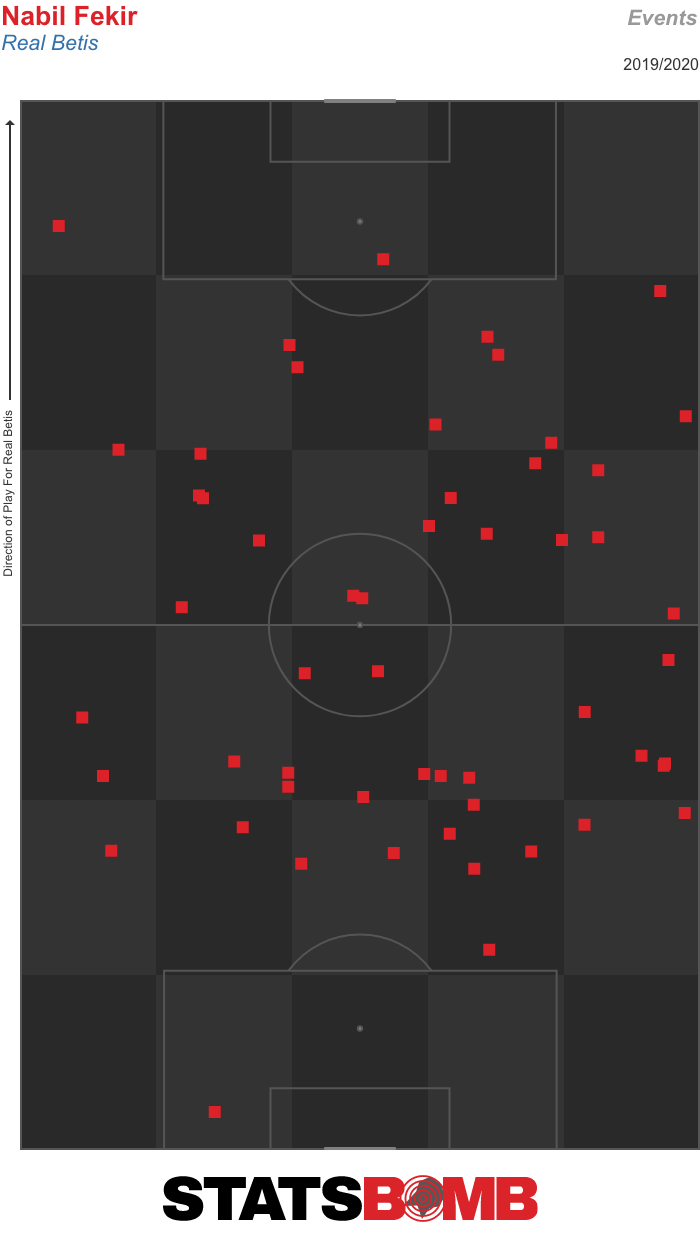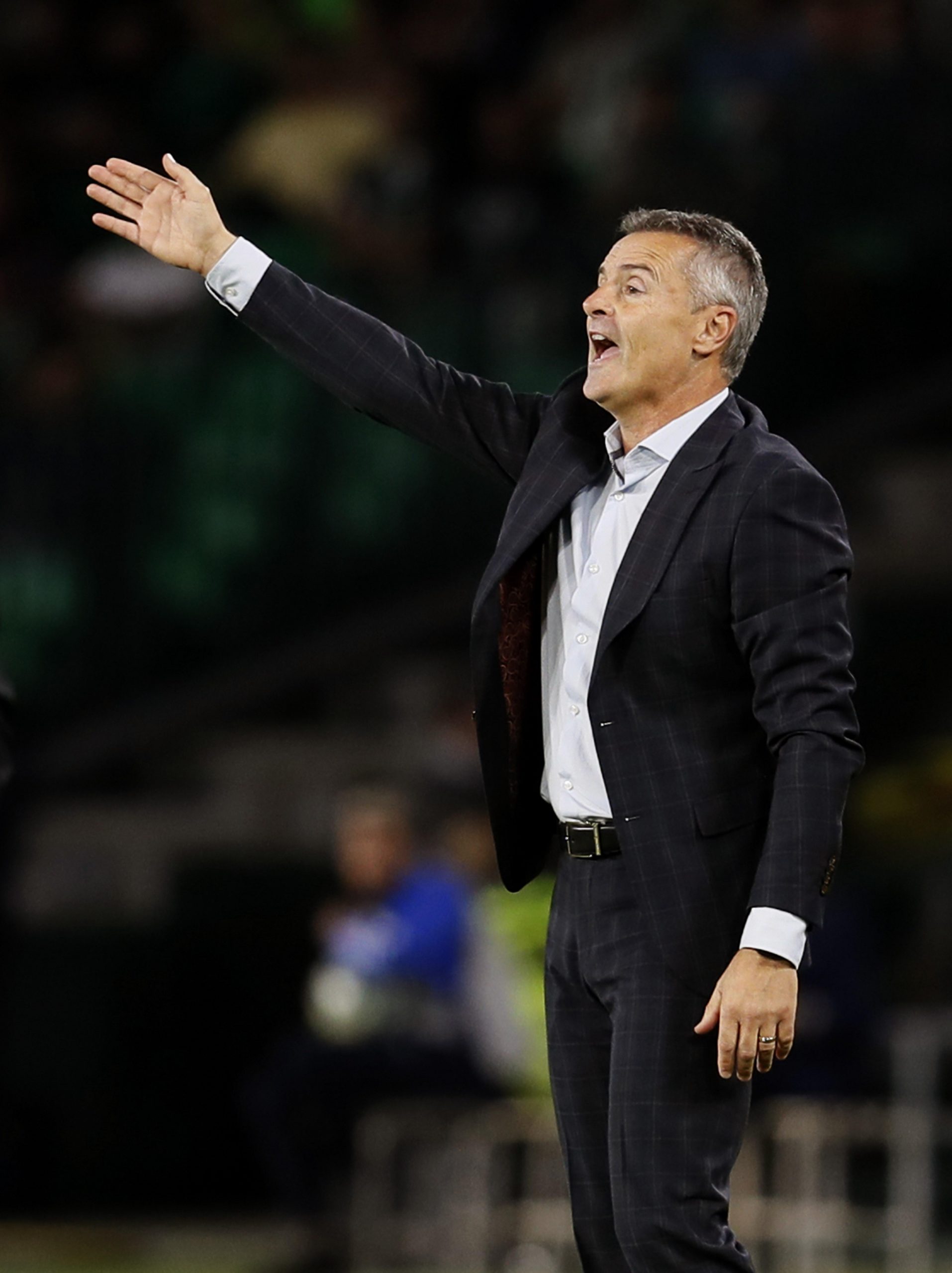Celta Vigo were once a club with a plan. Shrewd recruitment and a succession of good coaching choices established them as an upwardly mobile top-flight team capable of putting together deep runs in knockout competitions. But things have started to go astray. In the two and a bit seasons since Eduardo Berizzo ended his three-year spell in charge in the summer of 2017, Celta have hired and fired four different coaches. Fran Escribá was the latest to go after a 1-0 home defeat to Getafe on Sunday — a fourth consecutive loss that left Celta firmly in the relegation zone. Last season was particularly turbulent. Antonio Mohamed flip-flopped between approaches without success; Miguel Cardoso oversaw a disastrous 14-match spell in which attacking output fell off a cliff; and then Escribá came in, settled the ship, got the underlying numbers moving in the right direction and achieved the results necessary to avoid relegation. 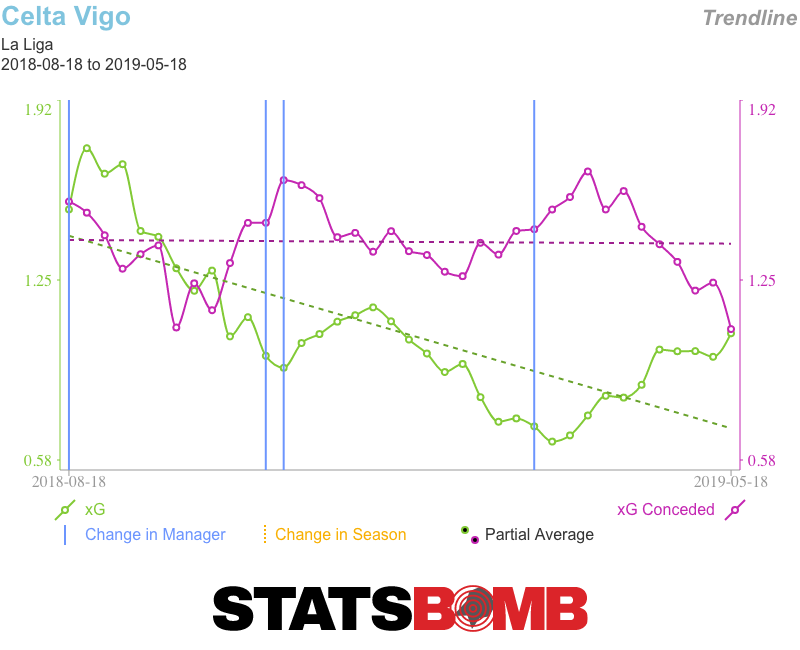 It was a job well done, but it was still surprising when the club elected to hand him a two-year contract. He was a pretty uninspiring choice for a team with a history of employing interesting and progressive coaches. Neither did it make much sense in view of the summer transfers leading up to this season. Amongst a series of signings largely funded by the departure of Maxi Gómez to Valencia was a trio of ball-playing, attack-minded players with previous links to the club: Denis Suárez, Rafinha and Santi Mina. Reports suggest the directorship acknowledged the tension between the profile of those players and Escribá’s primarily conservative approach, but it wasn’t enough to sway the decision. And so, Celta have become an example of what happens when you have a disconnect between recruitment and on-pitch playing style. Shackled by the confines of Escribá’s relatively boxy 4-4-2, a team featuring the aforementioned trio plus Iago Aspas (the top-scoring Spaniard in La Liga in each of the last three seasons) have scored just 6 times in 12 matches. Their underlying numbers aren’t much better.
It was a job well done, but it was still surprising when the club elected to hand him a two-year contract. He was a pretty uninspiring choice for a team with a history of employing interesting and progressive coaches. Neither did it make much sense in view of the summer transfers leading up to this season. Amongst a series of signings largely funded by the departure of Maxi Gómez to Valencia was a trio of ball-playing, attack-minded players with previous links to the club: Denis Suárez, Rafinha and Santi Mina. Reports suggest the directorship acknowledged the tension between the profile of those players and Escribá’s primarily conservative approach, but it wasn’t enough to sway the decision. And so, Celta have become an example of what happens when you have a disconnect between recruitment and on-pitch playing style. Shackled by the confines of Escribá’s relatively boxy 4-4-2, a team featuring the aforementioned trio plus Iago Aspas (the top-scoring Spaniard in La Liga in each of the last three seasons) have scored just 6 times in 12 matches. Their underlying numbers aren’t much better. 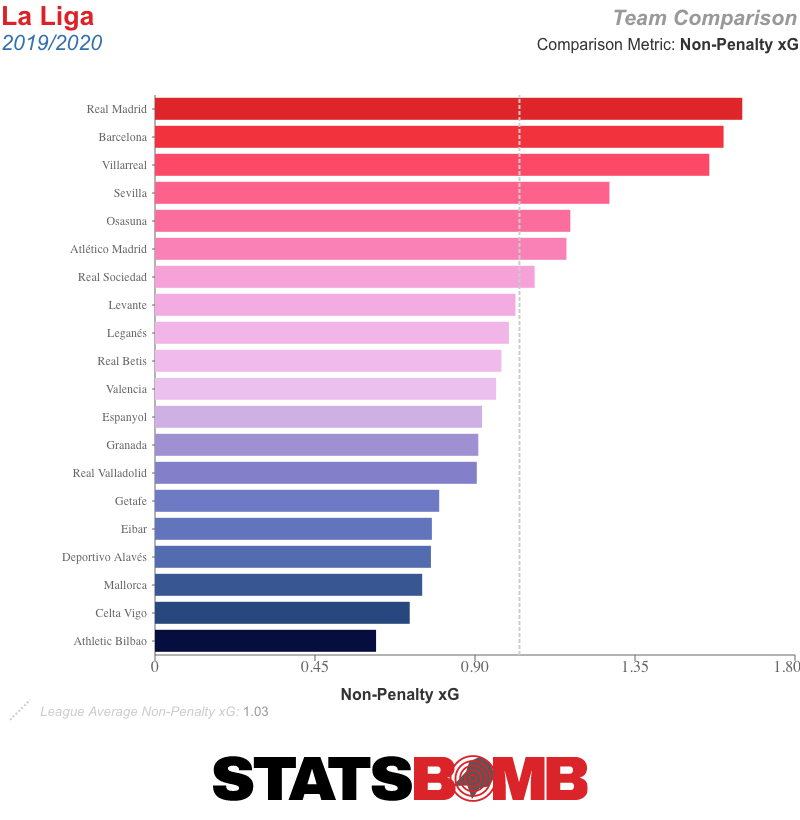 Celta have taken fewer shots (8.67) than all but Alavés, and their average shot quality (0.08 xG/Shot) is one of the lowest in the league. While under Escribá last season they were hardly an attacking powerhouse, even with the summer reinforcements, their numbers are even worse. They are creating less from pretty much everywhere: set pieces, counter attacks, high press situations. And it’s not even as if they’ve enjoyed a lot of attacking territory without quite managing to get off shots (a theory espoused by Escribá): they're sixth from bottom in their number of deep completions (successful passes within 20 metres of the opposition goal). Gómez has been missed. While with a primarily penalty box striker such as the Uruguayan, there is always a fairly symbiotic relationship between service and shot output, he did have an uncanny ability to get himself to the ball inside the area and finish at an above-average rate. Celta’s attacking issues do, though, feel more systemic than individual. The guys who were there last season, like Aspas and Brais Méndez — a wonderfully smooth player who appeared on the verge of a potential breakout campaign — have seen their attacking output drop off. As a team, they struggle to work the ball into good shooting positions, leaning more toward crosses as a means of entering the penalty area despite their lack of an obvious goalscorer there. That disconnect isn't only visible in the attack. Central defender Joseph Aidoo was the second-most expensive of the summer arrivals, coming in from Genk for an €8 million fee. He has certainly made an impression, for good or for bad, combining strong athletic qualities with questionable decision-making, both in and out of possession. But neither is he operating in the same context that he did at Genk. There, he performed impressively in a system that required him to execute more front-foot defending higher up the pitch. He was a high-volume tackler who won the majority of his individual ground duels.
Celta have taken fewer shots (8.67) than all but Alavés, and their average shot quality (0.08 xG/Shot) is one of the lowest in the league. While under Escribá last season they were hardly an attacking powerhouse, even with the summer reinforcements, their numbers are even worse. They are creating less from pretty much everywhere: set pieces, counter attacks, high press situations. And it’s not even as if they’ve enjoyed a lot of attacking territory without quite managing to get off shots (a theory espoused by Escribá): they're sixth from bottom in their number of deep completions (successful passes within 20 metres of the opposition goal). Gómez has been missed. While with a primarily penalty box striker such as the Uruguayan, there is always a fairly symbiotic relationship between service and shot output, he did have an uncanny ability to get himself to the ball inside the area and finish at an above-average rate. Celta’s attacking issues do, though, feel more systemic than individual. The guys who were there last season, like Aspas and Brais Méndez — a wonderfully smooth player who appeared on the verge of a potential breakout campaign — have seen their attacking output drop off. As a team, they struggle to work the ball into good shooting positions, leaning more toward crosses as a means of entering the penalty area despite their lack of an obvious goalscorer there. That disconnect isn't only visible in the attack. Central defender Joseph Aidoo was the second-most expensive of the summer arrivals, coming in from Genk for an €8 million fee. He has certainly made an impression, for good or for bad, combining strong athletic qualities with questionable decision-making, both in and out of possession. But neither is he operating in the same context that he did at Genk. There, he performed impressively in a system that required him to execute more front-foot defending higher up the pitch. He was a high-volume tackler who won the majority of his individual ground duels. 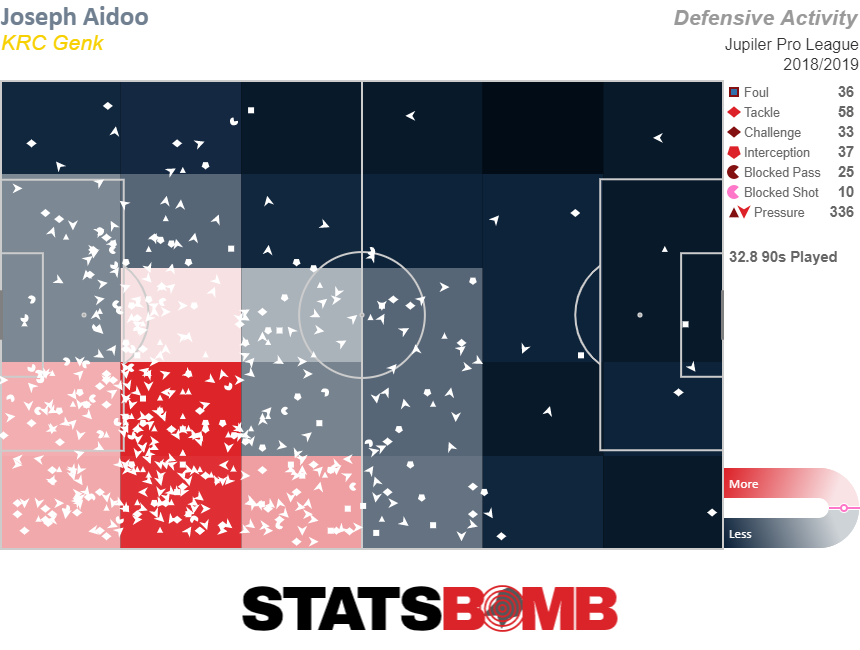 In contrast, at Celta he is part of one of the deepest defensive teams in La Liga.
In contrast, at Celta he is part of one of the deepest defensive teams in La Liga. 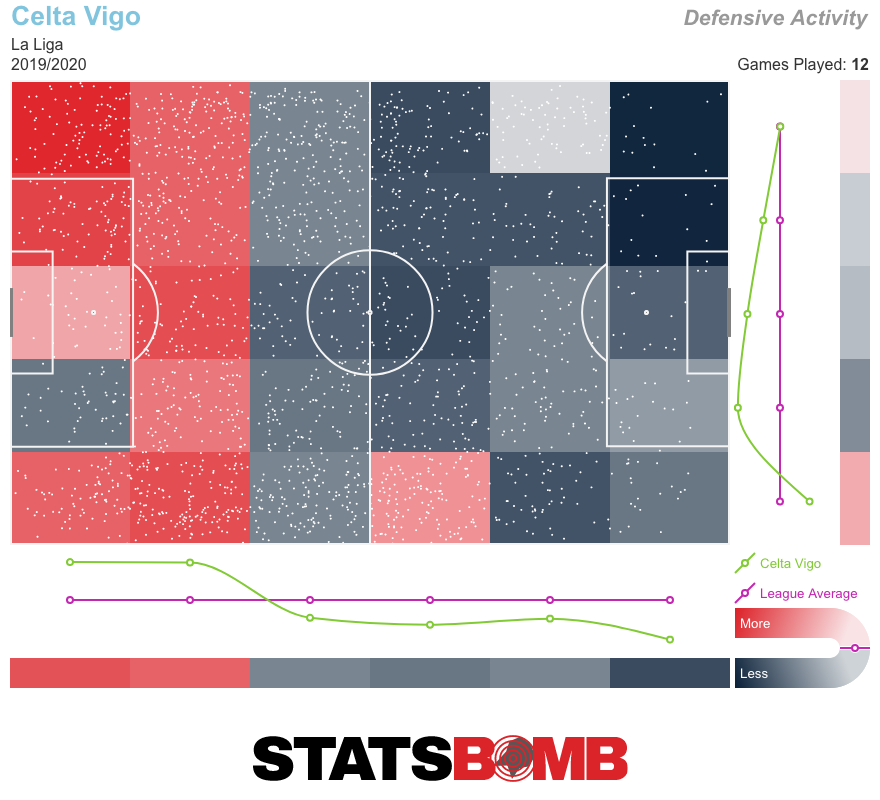 He's performing the majority of his defensive work inside his own penalty area. He is involved in more aerial duels than before and is frequently losing out on the ground.
He's performing the majority of his defensive work inside his own penalty area. He is involved in more aerial duels than before and is frequently losing out on the ground. 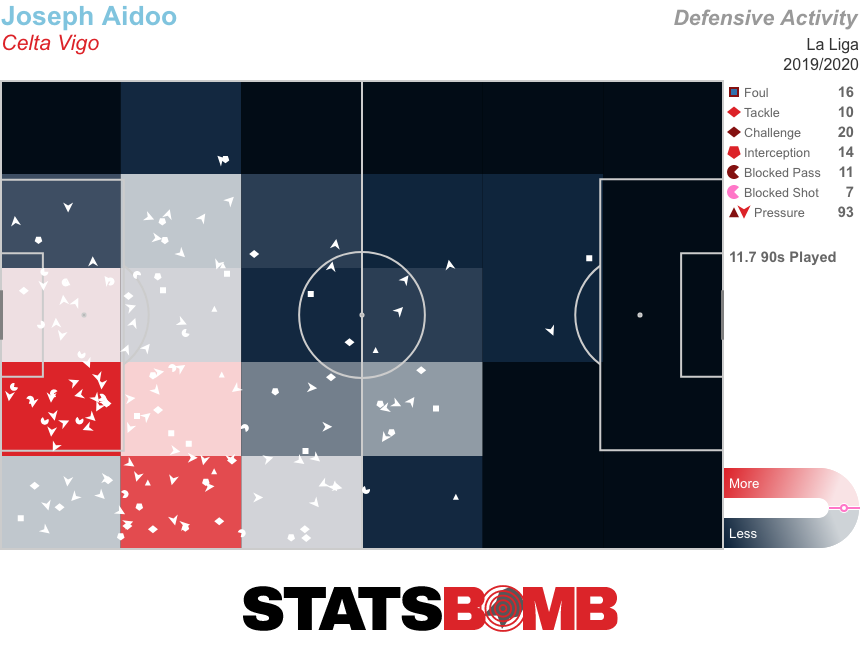 Celta’s underlying defensive numbers are the seventh-worst in the league. Not only are they in the bottom three with the third-worst goal difference in the division, but they are also in the bottom five in xG difference. By that measure, they have been worse this season (-0.34 xG difference per match versus -0.21) than during Escribá’s 12-match stretch down the back end of last.
Celta’s underlying defensive numbers are the seventh-worst in the league. Not only are they in the bottom three with the third-worst goal difference in the division, but they are also in the bottom five in xG difference. By that measure, they have been worse this season (-0.34 xG difference per match versus -0.21) than during Escribá’s 12-match stretch down the back end of last. 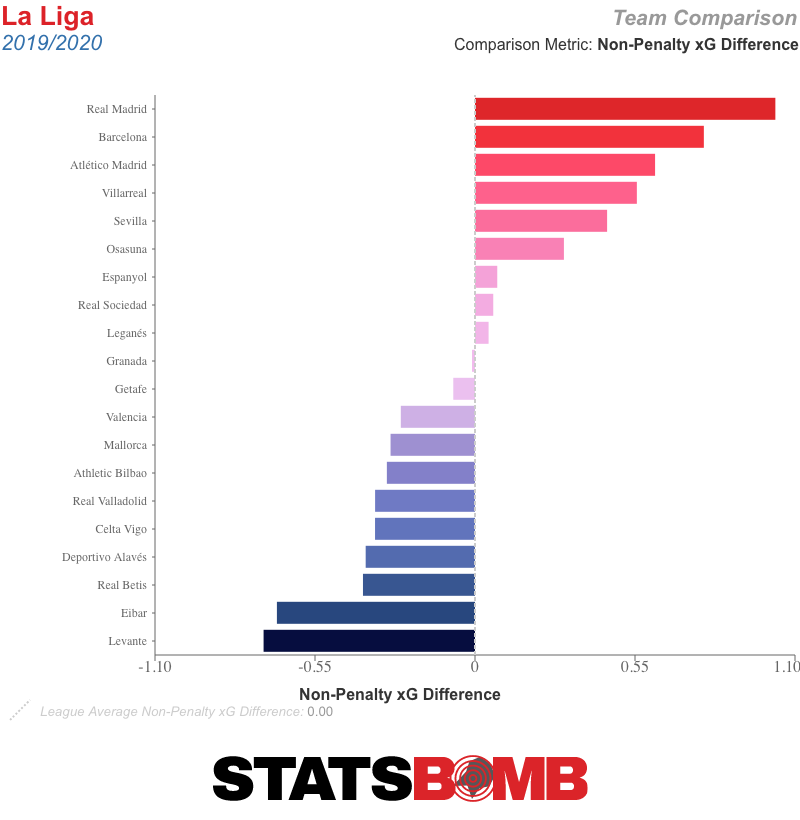 In the face of those top-line and underlying numbers, Celta had little choice but to remove Escribá from a position for which he was never really suited. After a series of unsuccessful and short-lived coaches, surely they would next seek stability in a proven operator like Abelardo or Quique Setién, the latter of whom seems tailor-made for their squad. Instead, they turned to Óscar García, the antonym of stability. Across seven previous coaching jobs, the longest the 46-year-old has ever remained in a position is his season and a half at Red Bull Salzburg. The others have lasted one season or less. His last two, at Saint-Étienne in France and Olympiacos in Greece, ended within 14 matches of taking charge. García’s possession-based approach certainly looks more apt for a squad that features midfield talents such as Stanislav Lobotka and Fran Beltrán, and apparently Celta have considered him before. But it is hard to get over the impression that he is still riding his earlier associations with Barcelona (where he acted as a youth coach), Johan Cruyff (whom he played under at Barcelona and worked with as an assistant during sporadic Catalonia national team matches) and Salzburg. To say that the jury’s out on him would almost be a generous appraisal. Celta had to do something. Simply removing the restrictions created by their previous system should nudge their attacking output up to an acceptable level. But this is also an appointment that could go very wrong indeed. The plan Celta once clung to so firmly appears to have gusted off into the Atlantic Ocean.
In the face of those top-line and underlying numbers, Celta had little choice but to remove Escribá from a position for which he was never really suited. After a series of unsuccessful and short-lived coaches, surely they would next seek stability in a proven operator like Abelardo or Quique Setién, the latter of whom seems tailor-made for their squad. Instead, they turned to Óscar García, the antonym of stability. Across seven previous coaching jobs, the longest the 46-year-old has ever remained in a position is his season and a half at Red Bull Salzburg. The others have lasted one season or less. His last two, at Saint-Étienne in France and Olympiacos in Greece, ended within 14 matches of taking charge. García’s possession-based approach certainly looks more apt for a squad that features midfield talents such as Stanislav Lobotka and Fran Beltrán, and apparently Celta have considered him before. But it is hard to get over the impression that he is still riding his earlier associations with Barcelona (where he acted as a youth coach), Johan Cruyff (whom he played under at Barcelona and worked with as an assistant during sporadic Catalonia national team matches) and Salzburg. To say that the jury’s out on him would almost be a generous appraisal. Celta had to do something. Simply removing the restrictions created by their previous system should nudge their attacking output up to an acceptable level. But this is also an appointment that could go very wrong indeed. The plan Celta once clung to so firmly appears to have gusted off into the Atlantic Ocean.
Stats of Interest
Barcelona lost away from home for the third time this season, at Levante on Saturday. While their underlying defensive numbers are slightly better on their travels, something bad happens to their attack the moment they leave the comfort of the Camp Nou. 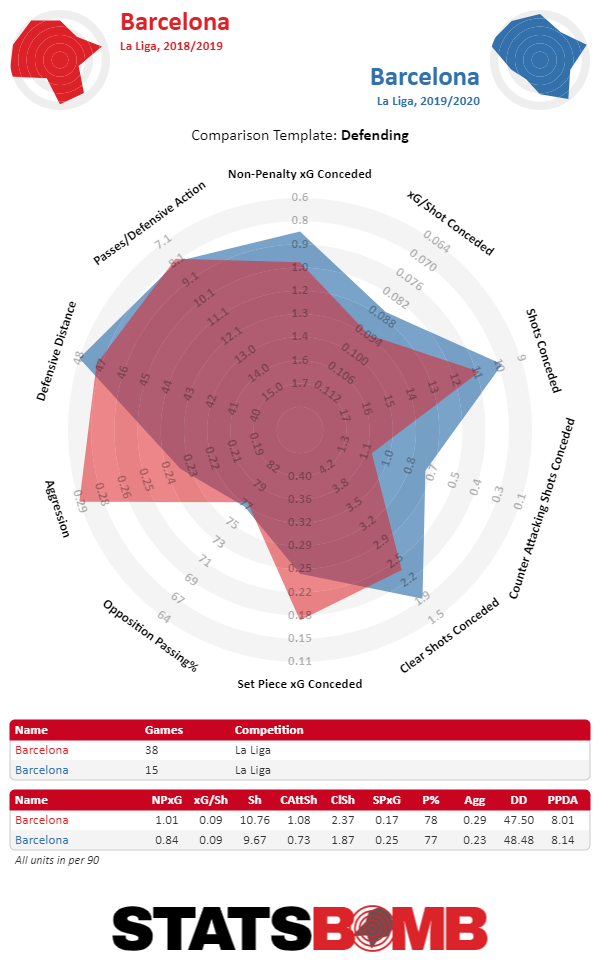 For some reason, La Liga defenders just can’t stop fouling Nabil Fekir. He has won 5.49 fouls per 90 minutes so far this season, over two more than Dani Parejo, the second-most fouled. He is tripped wherever he treads.
For some reason, La Liga defenders just can’t stop fouling Nabil Fekir. He has won 5.49 fouls per 90 minutes so far this season, over two more than Dani Parejo, the second-most fouled. He is tripped wherever he treads. 